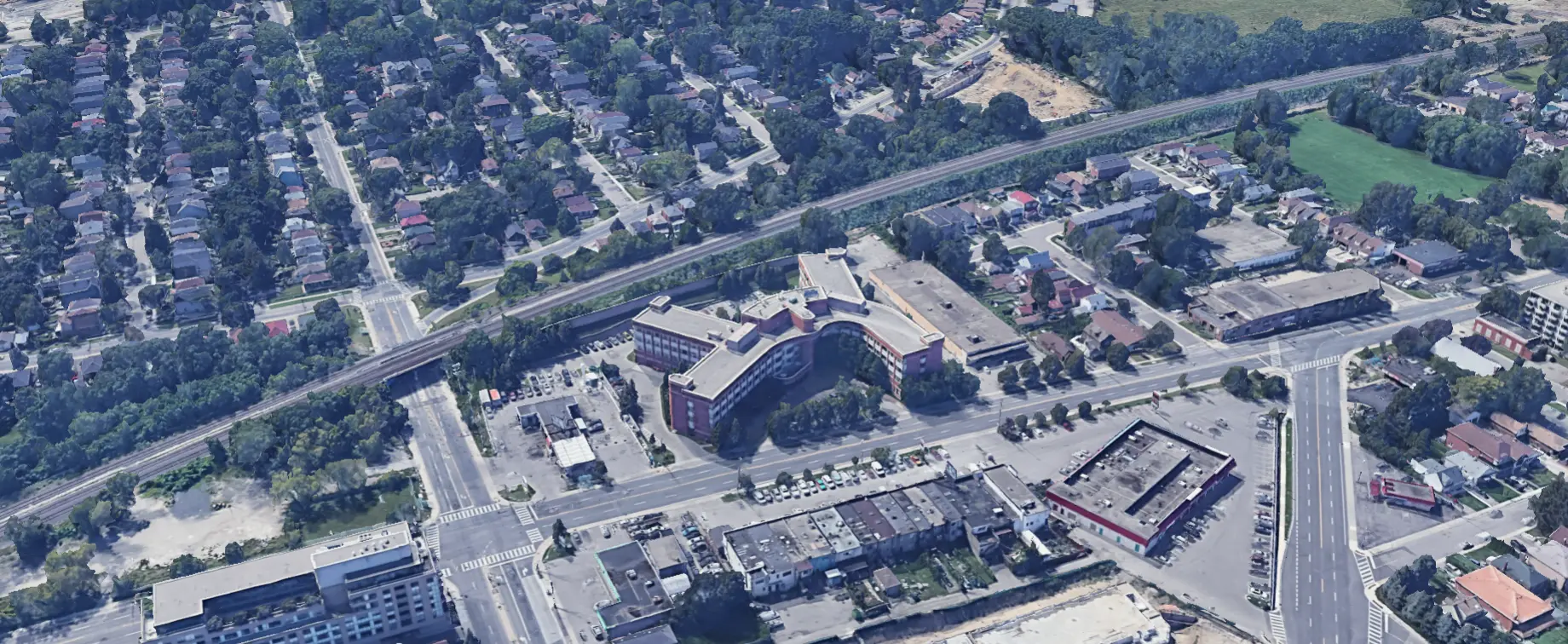Chester Village (3555 Danforth Avenue, Toronto) is operated by Broadview Foundation. The facility has a capacity of approximately 200 beds.
In response to growing concerns for the lack of services for seniors in the community, Broadview Foundation was created in 1967. Through the leadership of the Eastminster United Church, Chester Village was built and opened its doors in 1972.
In this article, our Good Caring Canada team has reviewed Chester Village from three essential angles: inspection reports, performance indicators, and resident profiles. You are encouraged to thoroughly review all three angles so you can be more informed about the quality and safety of Chester Village.
Table of Contents:
- Inspection Reports for Chester Village
- Performance Indicators for Chester Village
- Resident Profile of Chester Village
Inspection Reports for Chester Village
Chester Village is regulated by the Ontario Ministry of Health and Long-Term Care. The Ministry conducts inspections of all long-term care facilities to ensure that operations are in compliance with provincial regulations, and that residents receive proper care.
Our Good Caring Canada team has summarized inspection reports for Chester Village. You can read the original copies of the reports in the Government of Ontario website.
🔍 December 2023: Inspection
There were no findings of non-compliance.
🔍 August 2023: Inspection
The licensee has failed to ensure that a resident’s altered skin integrity was reassessed at least weekly by a member of the registered nursing staff.
A resident had an altered skin integrity after an incident. The altered skin integrity was assessed weekly and this assessment was completed on Point Click Care (PCC). However, the scheduled weekly wound assessment was not completed for an identified period.
A Registered Nurse, who is the home’s lead for skin and wounds, stated that the registered staff is responsible for completing the weekly wound assessment. A Registered Practical Nurse confirmed that the scheduled weekly wound assessment for an identified date was not signed on the TAR (Treatment Administration Record) and an assessment was not completed on PCC.
🔍 May 2023: Inspection
A complaint inspection was led by Christine Francis, taking place from May 10 to May 15, 2023.
The focus was on a complaint regarding neglect, complaints handling, continence care, and the communication and response system.
This inspection at Chester Village highlighted significant concerns in the handling of resident care, particularly in skin and wound assessment and the management of complaints.
- Skin and Wound Care: The licensee failed to ensure a proper skin assessment for resident #001 using a clinically appropriate assessment instrument, despite altered skin integrity being noted. The Assistant Director of Care acknowledged this failure, which increased the risk of worsening the resident’s skin impairment.
- Complaints Procedure: There was a failure to comply with the home’s complaints policy. Specifically, a “Customer Service Response Form” (CSRF) was not completed for a verbal complaint received about resident #001’s care. This non-compliance was acknowledged by the Assistant Director of Care and the CEO, indicating a lapse in following the established complaints handling procedure.
🔍 March 2023: Inspection
A follow-up and critical incident system inspection was led by Ryan Randhawa, taking place from March 7 to March 10, 2023.
The inspection addressed several intakes including unsafe transferring and positioning, drug administration, insulin documentation practices, and plan of care issues.
This inspection at Chester Village brought to light critical issues in medication security, transferring and positioning techniques, and adherence to pain management policies.
- Medication Security: On March 7, 2023, a medication cart was left unlocked and unattended in the hallway. RPN #105 subsequently locked the cart upon notification. This oversight increased the risk of unauthorized drug access.
- Transferring and Positioning Techniques: A PSW student failed to position a resident safely, resulting in injury. ADOC #100 confirmed the resident’s specific needs for mobility device footrests, highlighting the risk involved in improper positioning.
- Pain Management Policy Compliance: The facility’s pain management policy was not followed for resident #001, who was in pain with a significant condition change. Although a scheduled pain medication was administered, a required pain assessment was not completed. This failure posed a risk of misinterpreting the resident’s pain.
🔍 January 2023: Inspection
A critical incident system inspection was conducted by lead inspector Nira Khemraj and Kim Lee. Tthe inspection took place on January 6, 9, 10, 12, and 13, 2023.
The inspection focused on various critical incidents including multiple falls resulting in injury and hospitalization, and a medical emergency.
This inspection at Chester Village revealed significant issues in falls management, adherence to care plans, COVID-19 assessment procedures, and use of RAT kits.
- Plan of Care: The licensee failed to revise the care plan for resident #002 when falls prevention devices were no longer necessary. PSW #102 and PT #110 acknowledged the need for updating the plan.
- Fall Prevention and Management: Post-fall assessments were not conducted for resident #002 following two falls, in contradiction to the LTCH’s policy.
- Policy Compliance: The Head Injury Routine (HIR) was not followed as required after resident #002 sustained multiple falls. This non-compliance risked delayed identification of health status changes.
- Directives by Minister: Daily COVID-19 assessments, including temperature checks for residents #001 and #002, were not documented, contrary to the minister’s directive, posing a risk of infectious disease spread.
- Use of Equipment: RAT kits were not used in accordance with manufacturers’ instructions, leading to the risk of ineffective infectious disease control.
- Falls Interdisciplinary Program: The licensee failed to implement a falls interdisciplinary program to reduce injury risks, particularly after resident #001’s fall.
Three compliance orders were issued focusing on medication administration, documentation, and care provision in line with plans of care.
🔍 May 2022: Complaints Inspection
A complaint inspection was conducted by Mark McGill, focusing on issues related to personal care, bathing, maintenance services, supply availability, pain management, and falls prevention.
The findings highlight issues in the proper documentation of care and adherence to pain management protocols.
- Plan of Care Documentation: The licensee failed to document the provision of care set out in the care plan, particularly in documenting showers and baths for residents. Six instances of undocumented showers were identified.
- Policy Adherence: The facility did not comply with its pain management policy, specifically failing to complete a Pain Assessment Tool within 24 hours of a resident’s admission, resulting in an 8-day delay.
The inspection resulted in two Written Notifications (WNs) being issued for non-compliances regarding the documentation of care provided and adherence to established pain management policies.
🔍 February 2022: Proactive Compliance Inspection
A Proactive Compliance Inspection was conducted from January 11-21, 2022, with an off-site component on January 17. Inspectors Julieann Hing (649) and Ivy Lam (646) led the inspection.
- Plan of Care: There was a failure in staff collaboration during resident assessments, leading to inconsistencies and a lack of integration in care plans. Specifically, dietary needs were not accurately updated or communicated among staff, resulting in a resident receiving incorrect meal textures. The failure to update diet lists and care plans, along with the absence of necessary referrals to a Registered Dietitian, were noted.
- Policies and Record: Issues centered around the management of medication, particularly narcotics. The inspection found instances of medication administration not being documented as per policy, narcotics not being counted consistently at shift changes by two registered staff, and improper disposal practices for discontinued or expired medications. These practices did not align with the home’s policies and increased the risk of medication errors and unauthorized access to medications.
- Bathing Requirements: The facility did not meet the mandated standards for resident bathing. Specifically, one resident’s care plan stated they should receive a bath and a shower each week. However, inspection findings revealed that the resident was often only bathed once per week, and sometimes even less frequently, due to staffing constraints during outbreaks. This failure to adhere to the prescribed bathing schedule indicated a lapse in meeting the resident’s hygiene needs and preferences.
- Critical Incident Reporting: The home failed to promptly report an outbreak of a communicable disease, as defined in the Health Protection and Promotion Act, to the Director. This was discovered when inspectors arrived and were informed of an ongoing COVID-19 outbreak that had not been properly reported through the Critical Incident System. The home had created but not submitted the required report, leading to a delay in official notification and response to the outbreak. This lack of timely reporting could have implications for disease management and control within the facility.
The licensee was requested to prepare written plans of correction for each non-compliance issue to ensure better collaboration in care, compliance with policies, proper bathing practices, and accurate reporting of critical incidents.
Performance Indicators for Chester Village
Our research team at Good Caring Canada has compiled data on seven key performance indicators for long-term care facilities in Ontario.
We invite you to review each of the below indicators — to compare Chester Village with other long-term care facilities in Ontario.
- 💊 Potential misuse of antipsychotics is measured by the percentage of residents taking antipsychotic drugs, without a diagnosis of psychosis
- 🔒 Potential excessive use of physical restraints is measured by the percentage of residents in daily physical restraints
- 🤕 Fall risk is measured by the percentage of residents who fell in the 30 days leading up to the date of their quarterly clinical assessment
- 🦽 Worsened physical functioning is measured by the percentage of residents who worsened or remained dependent in transferring and locomotion (mid-loss ADLs), less residents who improved or remained independent
- 🩹 Worsened pressure ulcers is measured by the percentage of residents whose stage 2 to 4 pressure ulcer worsened since the previous assessment
- 😣 Pain is measured by the percentage of residents who report to have moderate daily pain or horrible/excruciating pain at any frequency
- ☹️ Worsened depressive mood is measured by the percentage of residents whose mood from symptoms of depression worsened
Resident Profile of Chester Village
Understanding the resident profile of a long-term care facility can help you assess the facility’s appropriateness and compatibility for a patient. Our research team at Good Caring Canada compiled data on three main elements to understand resident profiles. We invite you to review each of the three below elements.
- 👵🏻 Gender profile can be helpful for assessing the gender compatibility of a long-term care facility.
- 👴🏻 Age profile can be helpful for assessing whether a long-term care facility has experience in caring for residents of specific age groups. More residents of advanced age may imply potential challenges to adequate and equitable care for all residents in the facility.
- 💭 The percentage of residents with dementia can be helpful for assessing whether a long-term care facility is aware and ready for dementia care. A higher percentage may imply more relevant care services. A higher percentage may also imply potential challenges to adequate and equitable care for all residents in the facility.

